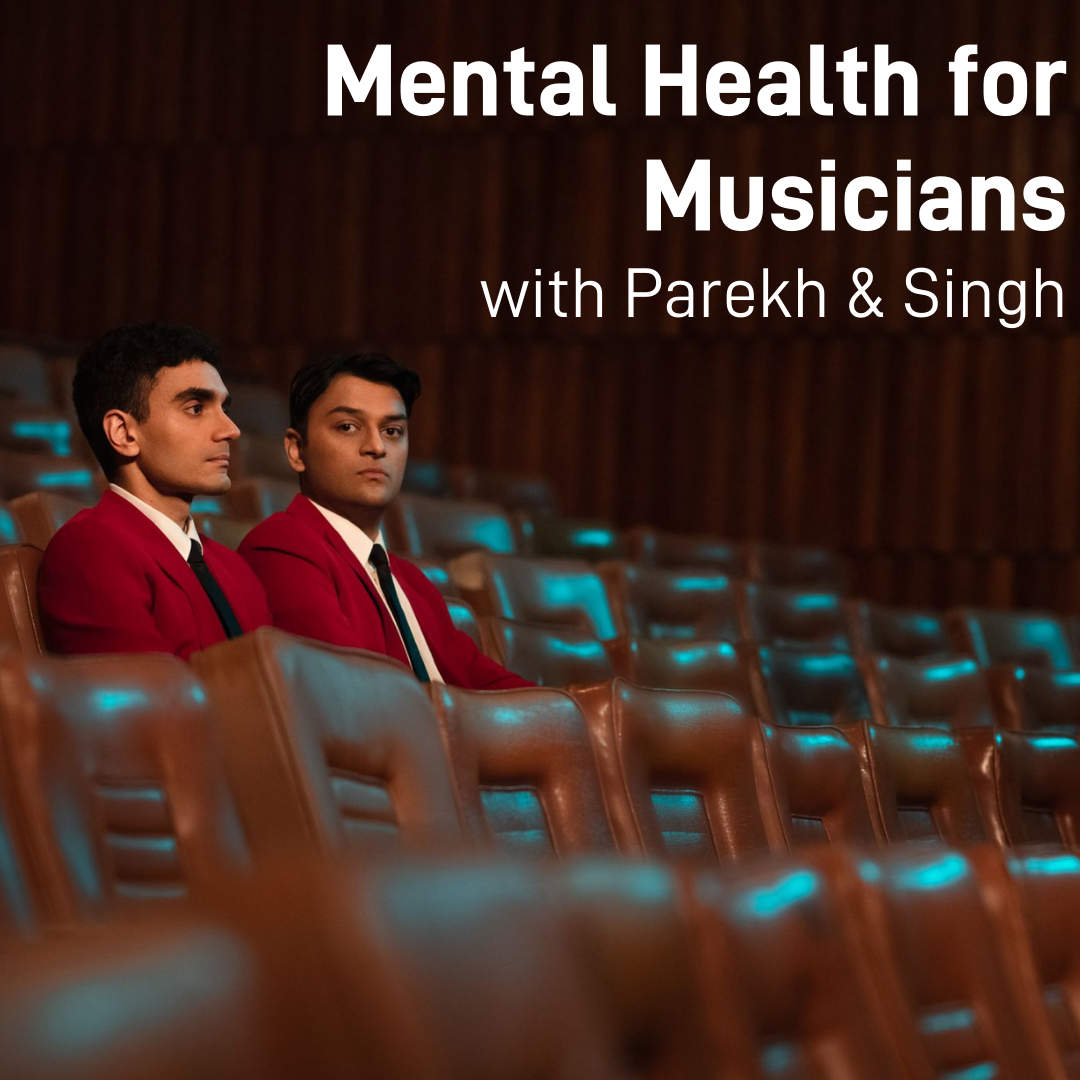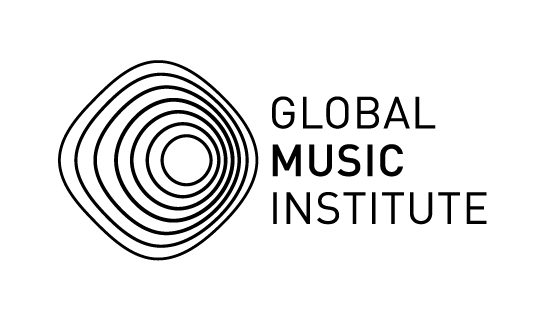
12 May Mental Health for Musicians with Parekh & Singh
The notion of the tortured soul finding creative outlet in music has pervaded through the ages. But are health and music mutually exclusive? Does one have to be sacrificed in order to achieve the other? We sat down with the celebrated duo Parekh & Singh to talk about mental health, the circumstances that led to the cancellation of their 2019 tour ‘Science City’, what it takes to be a modern day music professional, and more.
This interview has been edited and condensed for length and clarity.
Nischay, you have previously spoken about your experience of anxiety. How have you gone about managing your anxiety and what has that experience been like? Jivraj, what has your experience been of supporting your bandmate through this experience?
Nischay: One of my longest relationships in life has been with my anxiety. I had a lot of anxiety around performance and life in general because the few times I did actually go in for professional therapy, the broad consensus was that it was a generalised anxiety disorder which is quite common. It fused itself with performance and the music business aspect of it. In 2019 and the decade that preceded it, I was not very well equipped internally in finding the right tools or living a balanced healthy life to support and manage all of that anxiety. I wouldn’t say that there is anyone who can claim to have 100% handle over generalised anxiety disorder. It’s always a process and it’s always evolving. My thinking about it at that stage was that it’s a problem, or an issue that I need to get rid of rather than learn to manage and live with. There was a switch that went off somewhere around 2019 and I needed that dramatic exclamation point to wake myself up to that fact that this is something that is a part of you and a part of your process in life so either you deal with it in a healthy manner or succumb to it and keep battling it.
Jivraj: The relationship with Nischay has been educational in a lot of areas where I wasn’t spending much time thinking about. Mental health being one of them- I was pretty oblivious in the ten years leading up to 2019. I didn’t know what that phrase meant, honestly. Learning what Nischay was going through and how he was dealing with it opened my eyes inwards into things I needed to deal with and wasn’t even aware of. I started going to therapy because of Nischay. It has given me a lot of food for thought.
Anxiety can be a very debilitating experience. How were you managing your commitments professionally whilst managing this internal struggle?
Nischay: With me, it was always mostly based around performance and travel for performance. Luckily when it came to other aspects of the music business, the anxiety didn’t seem to creep in as much. My brain felt safer in certain environments but not in others. It really reared its head every time a tour or a concert or performance was at hand. But of course when you are a musician, you are going to perform. Whether you are performing in the studio or you are performing on stage- that’s what you’re selling. When you’re anxious about something, you tend to separate the two when actually it’s the same. When you’re a recording artist, you perform what you record. It’s not supposed to be that much different. I guess it’s just the nature of what live performance is- it’s its own beast you know. The other paraphernalia that surrounds it– the sound check, travel,the wait, and the new environments you find yourselves in as a travelling musician– those are the things that suddenly become uncontrollable and become a bigger deal than what they are. They are places and people and environments. But when you are anxious, it’s difficult to see it for what it is.
What were the factors that led to the cancelling of the 2019 tour and how did you arrive at that decision?
Nischay: As with anything that revolves around anxiety, it’s never just a single event but a culmination of things. We played the first show of that tour which was in Kolkata and from the music-making standpoint, the music was there to be very fair. We were ready musically but organisationally we were not even at 20% and that was a stressful thing in itself. There were a couple of auditoriums in the tour that we had booked and in fact in Mumbai, there was a big debacle because till the last day, the day before our first show, we were cancelling a deposit on one of the auditoriums and putting down a deposit on a brand new space. Jivraj and I had to go into our own finances so it was bad financial management and logistically, we weren’t at all prepared.
I was getting a lot of panic attacks after that first Kolkata show and with a panic attack, I don’t think there is any concrete research or medical evidence as to what really goes on because everyone reports such different experiences from their own panic attacks. It wasn’t a good feeling in my body. It’s also quite exhausting to be anxious at that level– my energy was really all over the place and I felt it was unhealthy for my body to be going through so many highs and lows. My body was showing reactions that it hadn’t shown before that was also alarming. Before that second show, I went over to Jivraj’s house and I told him what was going on personally, and that logistically we were nowhere so it would be better if we didn’t do the tour because we wouldn’t be able to give our fans the experience we wanted to give them. Honestly at the end of the day, that’s the only reason Jivraj and I were doing this. The good thing is that the cancellation never really felt like a stepback. It was always understood that this is what needs to happen now and of course, we have performed since then.
The truth is that it’s not always just the anxiety of performing, as artists it’s also the anxiety of being the entrepreneur who is in charge of this entrepreneurial exercise. For the 2019 tour, we were totally under equipped and not prepared at all for what was coming aside from the performance. In this business, it’s pretty rare that you are absolutely at cruising altitude. It’s often just take-off and landing. The only way to combat that is to be better prepared earlier. Preparation is the key- whether it’s for mental health or planning a tour for a band. Preparation involves all these things- mental health, logistical support, organisational support; and without those boxes checked, we didn’t feel comfortable doing the tour at that point.
Having had this experience, what advice would you give to young musicians aspiring to be professionals in the industry?
Nischay: Whiteknuckling is unhealthy for everyone- even the people you are working with. If you are going in there practically speaking, it’s not a sound decision to honour all of those things unless you are actually ready to honour it. And being ‘ready’ means to be mentally and physically prepared. If you’re a young musician, all of that stuff is as important as your craft. Being professional is more than just showing up on time. It’s all of these other things which you need to be ready for. There is this toxic environment especially in the artistic circle, especially filmmakers and musicians, of whiteknuckling stuff and being professional for the sake of being professional even if your output doesn’t reflect that certain level of professionality that you are propagating. It’s often because you are not prepared for that project mentally or physically, and you’re not there. And you need to be there in the artistic industry- it’s what we are selling. We are selling our emotions basically and unless we are entirely emotionally cognisant and we are clear in our thinking and our intentions, it’s not going to be a fruitful experience.
What did you get out of cancelling the tour?
Jivraj: We just realised that we were quite a ramshackle operation, organisationally. And there is a lot of organising that goes on if you’re a touring band so it helped us wake up to how loose we were. We started thinking about what we needed to do to become a more viable enterprise going forward so we could have some comfort within which we could just focus on making whatever we wanted to make. Hopefully, we are doing better now. Something that was quite eye-opening for me was also the thought that it’s okay to say no to stuff and honour how you’re feeling, and it has really helped me going forward. Putting myself first in a good way, and protecting how I feel and what I really want to do has helped me in things outside music. It’s really important for any young or new musician to take into account that you can put yourself first even when you’re enmeshed in a structure where there are demands from other people and expectations. You may think that you have to go along with the machine but you don’t because you are still a person in there. That’s a useful thing to keep in mind.
One external factor that had gotten a bit weird for me leading up to the tour was social media. We spent a lot of time building our social media presence in the first few months of that year and it started out as a fun project but I had gotten really entangled in that world, Instagram especially. I didn’t know it at the time but it was definitely proceeding down a path that I wouldn’t have been quite happy about had I allowed it to proceed. I was quite personally invested in it– almost like the character that I was playing in the band. Putting a stop to the tour gave me a chance to notice how things were unfolding for me personally, take a step back, and recalibrate my relationship with the medium which has been very helpful going forward. That was something I got out of the cancellation- a bit under the radar but quite palpable.
Social media has become an essential component of being a creative professional. How have you renegotiated your approach towards social media and how important do you think it is in the career of a musician?
Nischay: I don’t think we are very good at it, which is helpful from a mental health standpoint. Everything is release based. Since it’s a band, you won’t find a lot of candid, personal, lifestyle information on our feed and everything is related to work. Because we have had this aesthetic image of these suits and us being these characters, it’s been an easy mask to hide behind and to wear. I don’t see it as hiding. Everyone who knows us knows that that is work and this is life. We like to maintain work-life balance on social media because like you said, it’s part of the job. We like posting stuff and engaging with fans. There are little experiments we like to do from time to time. But we don’t take it too seriously in a sense because more and more as time goes by, I am getting less convinced that social media is an important tool for musicians. It is when you are starting out but once you build a fan base, there are so many other channels like a mailing list.
I feel the way in which you disseminate your information will become more and more personalised over time and for some artists, that will mean Instagram. For those who are good at using the medium and whose art lends well to the interface, will naturally gravitate towards that interface. But certain people might only be on a mailing list, certain people might be writing handwritten letters and sending cassettes to their fans- I don’t think there is any one size fits all and that disparity is revealing itself more and more. When there are so many different options, putting up pictures and putting up stories isn’t necessarily a driving factor in your career. It isn’t as important as people give it credit for. I feel there are other things that are equally if not more important than social media.. Everyone is always trying to post more but it’s one of the games you play. It’s not necessarily the make it or break it thing.
One of the factors commonly identified as a source of anxiety for many musicians is the definition of success. What is success for you? How do you negotiate the boundaries of success and be at peace with who you are as musicians and your creative output?
Nischay: For musicians, and young musicians, it’s super important to remember that you got into this against a lot of advice. I’m sure there are more people telling you that you can’t do this than people supporting you. For musicians who get into music, their dream is never to be a “successful” musician. Their dream is to always be a historically significant one or be a wildly experimental one. Those are the two poles that I’ve noticed- either I’m going to be groundbreaking and change the game, or I am going to go on the path of my heroes and go where they have where their steps are my map for success.
For us, it’s always about the connection with the fans. If I had to define success for Parekh & Singh it’s always: is our connection with our fanbase strong and is it working towards something? Are we evolving it or are we developing it? Secondly is the connection with ourselves as musicians and artists strong? There’s just those two connections that need to be strong and if both those lights are green, then we are good. And if one of those lights is red then we need to work on it. For me it’s quite simple. Shows, Instagram, social media– all of those things keep changing. Everything else is a variable but those two things need to be constant.
What are your tools for managing your mental health and keeping your health and wellbeing in check?
Jivraj: The only thing I have consciously worked on is disentangling my mind from my phone kind of aggressively over the past two and a half years. I can definitely feel the effects of that. I am loner anyway because I really like being actively disconnected from everyone and the world and doing what I want to do in isolation and solitude. And that was a little difficult when I was social through the phone and all the great software that is on our phones. I had to actively and drastically distract myself from that because it didn’t feel like a good extension of who I really was. I had kind of become this strange extrovert, and I could do it but it didn’t feel authentic. So I have gone back to being more of what feels like… who I am. Within which I am just quietly doing my own thing and nobody knows what I am upto except for a couple of people.
Nischay: Personally I have just found that focusing on my physical and mental health through therapy, meditation, exercise and having a regime of preparation really helps. Having it be regimented like this is and not leaving so many things upto ‘oh I’ll just wing it or I’ll improvise’ has helped me because then it becomes more of the system that it’s become, and easier for me. All of these are pieces of the same puzzle. I am not going to see a therapist currently but, all the tools I have taken from them are practices that I employ so if you want to start out, get yourself into therapy and if you can’t do that, there is a lot of great online counselling and that’s a good place to start.
With an upcoming album, and a tour planned around their new release, 2022 is a year of many musical offerings from Parekh & Singh! Stay tuned to their journey on Spotify and Instagram!
Written and interviewed by Senjuti Maitra



No Comments